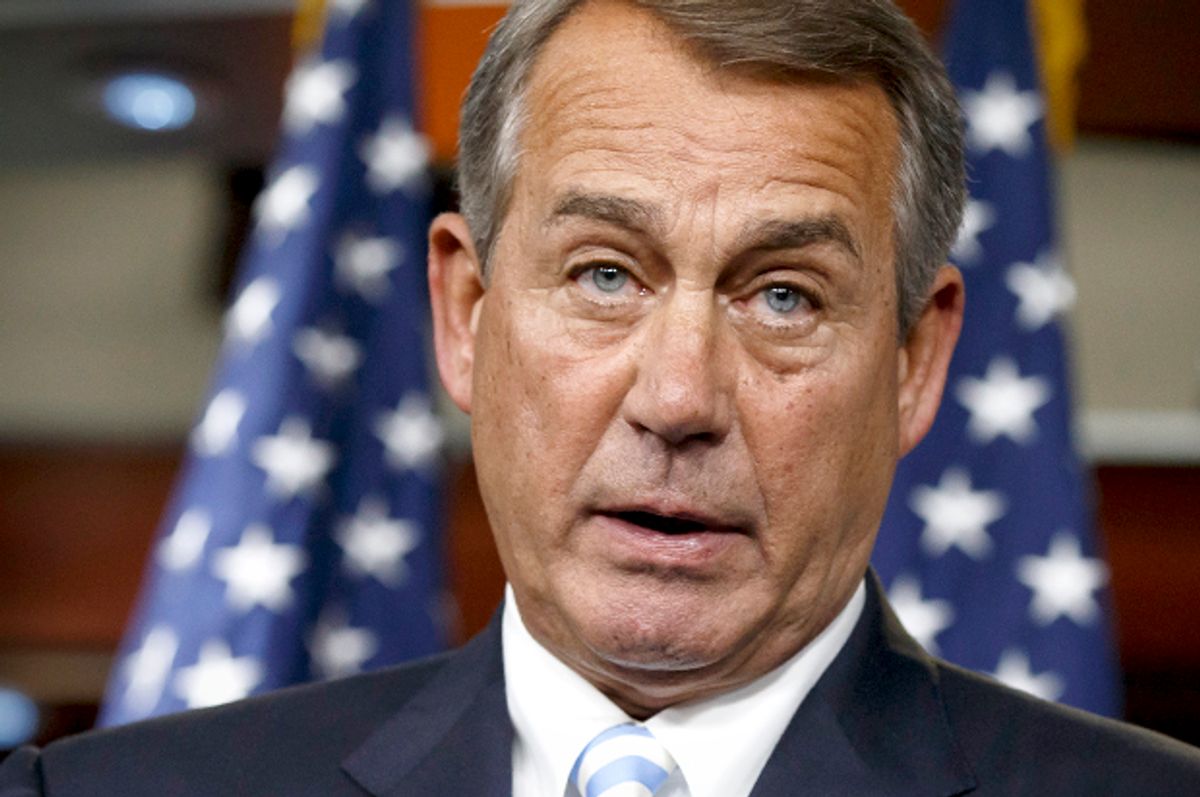John Boehner is worried about his legacy. According to the New York Times, the speaker of the House who shut down the government “does not want to be remembered as the shutdown speaker.” That’s understandable, but also a tall order – if history is any guide, speakers of the House who preside over government shutdowns tend to have difficulty shedding that image.
But with a large majority in the House at his back and a longing for historical significance in his heart, Boehner is determined to be remembered by history as someone who did something:
But what he is able to do with that power will determine whether he is remembered as something more than the House leader during a stretch of frustrating gridlock and deep partisanship.
“He’s never wanted to just be speaker,” said Representative Tom Cole, an Oklahoma Republican and a close ally. “He’s wanted to be a historically significant speaker.”
I’m not sure anyone with the ambition to actually become speaker goes into the gig planning to be an easily forgotten placeholder, but whatever. Boehner wants his speakership to be “significant” – so what does that mean? Well, for starters, according to the Times, it means getting a lockdown on basic governmental competence:
A spending agreement would represent a significant victory for the party establishment over more conservative lawmakers and activists spoiling for a shutdown confrontation. It would also put his new House on a potential path to enacting the kinds of big legislation – on budgetary issues, tax reform and energy policy – that he envisions.
This is where we’ve arrived as a nation: The speaker’s ambitious path to the history books begins with the “significant victory” of finding a way to keep the basic functions of government safe from the poisonous scheming of his own party. Every journey has to start somewhere, I suppose, and if Boehner were an upstart “rising star” politician coming into his first term as speaker, I might have some sympathy for him. But he is one of the primary authors of this dysfunction.
Boehner’s four-year stewardship of the House of Representatives has been marked by his own deliberate efforts to spurn legitimate governance and his incompetence at reining in the kamikaze factions of the GOP. The fact that he’s likely cruising to reelection to speaker speaks to his wonderful luck and the venality of your average congressman – the one major rival he faced, Eric Cantor, got taken out in the primaries, and everyone else was brought to heel by Boehner’s fundraising prowess. If Boehner isn’t satisfied with his legacy to date, he has no one but himself to blame.
To that point, whatever ambition Boehner might have for his own legacy, he still faces the same limiting factors that have confronted him since 2011. Barack Obama is still in office, and to get anything accomplished he’ll have to get Obama’s signature. To get Obama’s signature, he’ll have to cut a deal with the president, which conservatives in his caucus will not allow. They won’t allow it because Boehner and the rest of the GOP leadership spent the past six years deliberately abjuring every opportunity to compromise with the White House, and that strategy has paid off electorally.
What it hasn’t done, however, is produce any tangible policy achievements. And that’s probably what's animating Boehner’s fit of existential angst. What has he done in his time as leader of the House of Representatives that stands out as a major legislative achievement? There have been a bunch of votes to repeal the ACA and a series of crises over the debt limit and government funding. The one big issue he promised to tackle this session of Congress – immigration reform – remains unresolved.
His record of leadership to date is defined almost entirely by its reflexive opposition to the president, and in the process he’s helped turn Congress into a dysfunctional morass in which elected representatives don’t actually know how to do their jobs. “Because Congress has not functioned as an orderly lawmaking body for so long,” the Times notes, the House leadership “find themselves having to educate members on the basics of legislating.”
Boehner has amassed power, but he hasn’t done much with it in his capacity as a legislator. Steve Benen makes the interesting argument that Boehner and the rest of the Republican leaders, by rejecting compromise and thus removing themselves from the governing process, have actually dealt conservative policymaking a setback. Rather than working with the White House, they’ve essentially dared Obama to act unilaterally on immigration and the environment. “Republicans might have been better off – which is to say, they would have ended up with a more conservative outcome – if they’d actually compromised and taken governing seriously in some key areas.”
Instead Boehner and his cohorts turned the government into a grinding, ineffectual disaster. He’s created an environment in which completing the otherwise mundane tasks of government is viewed as a real accomplishment. And he wants to be remembered by history not as the person who set that bar for accomplishment so very low, but as the person who barely managed to clear it.

Shares